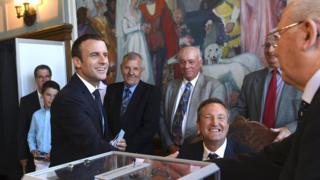 Image copyright
Image copyright
EPA
Emmanuel Macron was seen voting earlier in Le Touquet
French President Emmanuel Macron’s party is on track for a parliamentary majority, exit polls suggest, weeks after his presidential victory.
Two polls have his La République en Marche, alongside its MoDem allies, winning between 355 and 425 seats in the 577-seat National Assembly.
The winning margin is lower than some expected with turnout down from 2012.
The party was formed just over a year ago, and half of its candidates have little or no political experience.
The result, if confirmed, sweeps all of the mainstream parties aside, and gives the 39-year-old president a strong mandate in parliament to pursue his pro-EU, business-friendly reform plans.
The second round of the parliamentary election was marked by low voter turnout and was down sharply on five years ago.
Correspondents say opponents of Mr Macron may simply have not bothered to turn out for the vote.
What do the exit polls indicate?
Two polls projected La République en Marche (Republic on the Move or LREM) and MoDem combined winning 355-360 seats, but a third poll by Elabe awarded the two parties a bigger majority of between 373 and 403 seats.
A party needs 289 seats to control the 577-seat National Assembly.
It will be seen as a big blow to traditional parties on both the left and right.
The conservative Republicans and their allies could form a large opposition block, with 107-133 seats. But this figure is down from 200 seats in the last parliament.
Image copyright
AFP
FN leader Marine Le Pen won a seat for the first time, but her party performed worse than expected
The Socialists, who were in power for the past five years, alongside their partners, were predicted to get only 30-49 seats – their lowest tally ever.
The far-right National Front (FN) party looks set to get at least six seats, although it was aiming for 15.
FN leader Marine Le Pen, 48, has won a seat in parliament for the first time, representing Henin-Beaumont, a depressed former mining town in the north. But two of her top aides, including her deputy leader, were eliminated.
Where does France go from here? – by Hugh Schofield, BBC Paris correspondent
It has all happened so quickly that the country feels slightly dazed.
People are looking at their new leader, and many more than voted for him are honestly impressed by his calibre. But many are also wondering: where do we go from here?
There is an unknown aspect to the coming mandate that sets it apart from all that went before.
President Macron’s party didn’t exist until he dreamed it up, and half of the new parliamentarians will need lessons (literally) in how to do their jobs.
And never before – at least not since Charles de Gaulle in 1958 – has a head of state had such a powerful majority, made up of men and women who depend on him so personally for their new careers.
Macron’s conquest is complete – what now?
What are President Macron’s reforms?
The new French president needed a majority to push through the changes that he promised in his campaign, which include:
- Budget savings of €60bn (£51bn; $65bn) in the next five years
- Cutting the number of public servants by 120,000
- Reforming the labour market and generous state pension schemes, bringing them into line with private schemes
The interim LREM leader, Catherine Barbaroux, said the party could now start work towards changing France:
“Far from postures, our members of parliament, through their multiple experiences, will vote for laws to unlock our economy, free up our energies, create new solidarities and protect the French,” she said.
Who are the LREM candidates?
At least half of LREM candidates are unknown, drawn from a range of backgrounds. They include a retired bullfighter, a Rwandan refugee and a mathematician.
Mr Macron sought gender equality in candidate selection, which resulted in a 50:50 male to female ratio.
Image copyright
AFP
Among the LREM candidates who competed in the second round were Marie Sara, Hervé Berville and Cédric Villani
Macron’s party set for parliamentary majority, polls show

